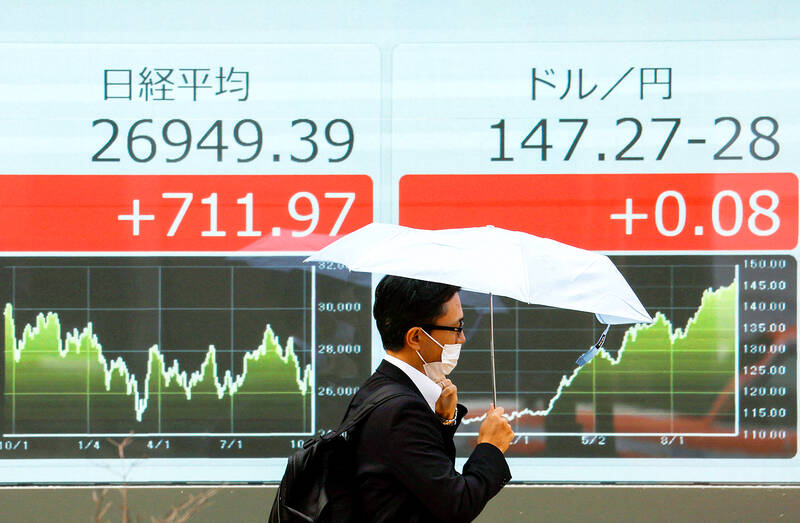The US dollar on Friday edged higher on Friday after dropping the previous day despite US inflation accelerating, helping it hit a 32-year peak against the yen.
Sterling slipped after a sharp rally on Thursday, as reports said British Prime Minister Liz Truss was preparing to sack her finance minister and carry out a major U-turn on the government’s tax plans.
The US dollar index rose 0.94 percent to ¥113.3, after falling 0.6 percent on Thursday as investors seemingly brushed off data that showed US consumer prices increased more than expected in September. The index was up 0.45 percent for the week.

Photo: Reuters
The greenback has been on a tear this year as the US Federal Reserve has ramped up interest rates in an effort to tame inflation, pulling money back toward the US. Fears about the global economy have also boosted the safe haven asset.
Yet, the stronger-than-expected inflation data on Thursday counterintuitively triggered a rally in global stock markets and a fall in the US dollar.
Analysts said that short-sellers reversing their positions seemed to have driven the bounce in equities, weighing on the dollar.
“Some of the detail perhaps wasn’t as worrying as the particular core [inflation] print suggested, so when the market started to sell off, people began to cover very quickly,” UBS foreign-exchange strategy head James Malcolm said.
In Taipei, the New Taiwan dollar fell against the greenback, shedding NT$0.005 to close at NT$31.884, up 0.68 percent for the week.
Japanese Vice Minister of Finance Masato Kanda said Japan would take “bold action” to stem currency volatility if needed, after the yen touched a 32-year-low.
Excessive currency moves have negative effects on the economy and the country is ready to take action if they continue, Kanda said late on Friday in Washington.
“We will take appropriate steps against excessive moves especially if that’s led by speculative trading,” Kanda said. “If we judge that currency moves are excessive and if that takes place repeatedly, we are always prepared to take bold action.”
The yen touched a low of ¥148.86 versus the dollar on Friday, the weakest level since August 1990, before ending the session at ¥148.67.
Whiplash moves earlier in the day sparked market chatter of potential intervention by Japanese authorities. A finance ministry official declined to comment on whether the country had stepped into markets again.
The British pound slipped on Friday, after rallying 2.1 percent on Thursday on reports the government could cancel many of its plans for unfunded tax cuts. Sterling fell 1.31 percent to US$1.1183.
Additional reporting by staff writer, with CNA and Bloomberg

Semiconductor shares in China surged yesterday after Reuters reported the US had ordered chipmaking giant Taiwan Semiconductor Manufacturing Co (TSMC, 台積電) to halt shipments of advanced chips to Chinese customers, which investors believe could accelerate Beijing’s self-reliance efforts. TSMC yesterday started to suspend shipments of certain sophisticated chips to some Chinese clients after receiving a letter from the US Department of Commerce imposing export restrictions on those products, Reuters reported on Sunday, citing an unnamed source. The US imposed export restrictions on TSMC’s 7-nanometer or more advanced designs, Reuters reported. Investors figured that would encourage authorities to support China’s industry and bought shares

TECH WAR CONTINUES: The suspension of TSMC AI chips and GPUs would be a heavy blow to China’s chip designers and would affect its competitive edge Taiwan Semiconductor Manufacturing Co (TSMC, 台積電), the world’s biggest contract chipmaker, is reportedly to halt supply of artificial intelligence (AI) chips and graphics processing units (GPUs) made on 7-nanometer or more advanced process technologies from next week in order to comply with US Department of Commerce rules. TSMC has sent e-mails to its Chinese AI customers, informing them about the suspension starting on Monday, Chinese online news outlet Ijiwei.com (愛集微) reported yesterday. The US Department of Commerce has not formally unveiled further semiconductor measures against China yet. “TSMC does not comment on market rumors. TSMC is a law-abiding company and we are

FLEXIBLE: Taiwan can develop its own ground station equipment, and has highly competitive manufacturers and suppliers with diversified production, the MOEA said The Ministry of Economic Affairs (MOEA) yesterday disputed reports that suppliers to US-based Space Exploration Technologies Corp (SpaceX) had been asked to move production out of Taiwan. Reuters had reported on Tuesday last week that Elon Musk-owned SpaceX had asked their manufacturers to produce outside of Taiwan given geopolitical risks and that at least one Taiwanese supplier had been pushed to relocate production to Vietnam. SpaceX’s requests place a renewed focus on the contentious relationship Musk has had with Taiwan, especially after he said last year that Taiwan is an “integral part” of China, sparking sharp criticism from Taiwanese authorities. The ministry said

US President Joe Biden’s administration is racing to complete CHIPS and Science Act agreements with companies such as Intel Corp and Samsung Electronics Co, aiming to shore up one of its signature initiatives before US president-elect Donald Trump enters the White House. The US Department of Commerce has allocated more than 90 percent of the US$39 billion in grants under the act, a landmark law enacted in 2022 designed to rebuild the domestic chip industry. However, the agency has only announced one binding agreement so far. The next two months would prove critical for more than 20 companies still in the process